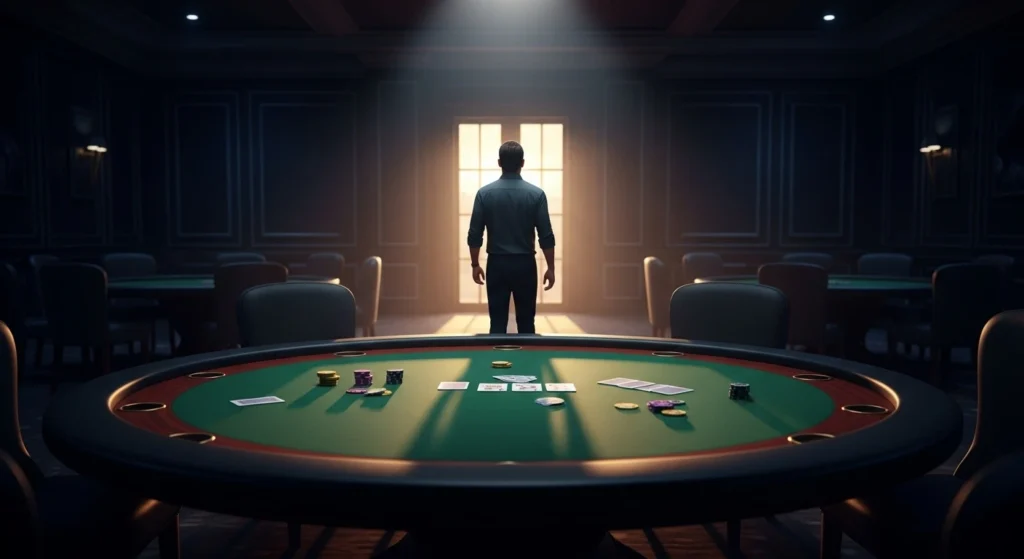
Покер — это не просто игра в карты, это сложная битва умов, психологии и терпения. Один из важнейших навыков в покере — не просто правильно играть свои карты, но и знать, когда стоит уйти за стол. Будь то на одну ночь или навсегда, решение о том, когда снимать деньги, так же стратегическо, как и любой шаг во время игры. Это подробное руководство охватывает все аспекты — финансовые, эмоциональные и стратегические — которые определяют, когда стоит выйти за покерный стол.
Содержание
Коленчатый рычагФинансовые соображения
Умный покер предполагает эффективное управление банкроллом. Каждый игрок должен начать с четких финансовых границ, включая максимальный убыток, с которым он готов справиться, известный как лимит стоп-лосс. Такая финансовая дисциплина помогает избежать опасного пути погони за убытками, который может привести к быстрому истощению средств. Кроме того, постановка цели по прибыли может послужить сигналом к тому, чтобы уйти, пока вы впереди, обеспечив прибыль до того, как ситуация изменится.
Узнайте больше об удобной для игроков покерной среде в нашем Руководство по приложению ClubGG Poker.
Эмоциональное и физическое состояние
Эмоции в покере на высоком уровне, а игра требует острой концентрации и умения принимать решения. Очень важно распознавать, когда вы больше не играете оптимально — будь то из-за усталости, стресса или разочарования. Эмоциональные решения, часто называемые «тильтом» в покерной терминологии, обычно приводят к ошибкам и поражениям. Если вы замечаете признаки эмоционального подавления или физической усталости, это сильный сигнал «выйти из игры»
Достижение ваших целей
Постановка конкретных целей для каждой сессии может помочь вам принять решение о том, когда уйти. Эти цели могут быть связаны с финансовой выгодой, количеством сыгранных рук или просто получением определенного опыта против определенных типов игроков. Как только эти цели будут достигнуты, рассмотрите возможность обналичивания средств, чтобы избежать ненужных рисков.
Чтобы узнать больше о поведении и моделях поведения в покере, посетите наш FAQ – Часто задаваемые вопросы страница.
Качество игры
Характер игры сам по себе часто диктует лучшее время для выхода. Это включает в себя уровни мастерства ваших оппонентов, ставки и общую динамику стола. Если вы оказались за столом, который больше не приносит прибыли или где игроки значительно более опытны, сохранение своего банкролла путем ухода часто является самым мудрым решением.
Долгосрочная стратегия
Для серьезных или профессиональных игроков покер – это не только отдельные сессии, но и долгосрочный успех. Решения о том, когда следует оставить игру, влияют на более широкие карьерные стратегии, включая управление репутацией, сезонные цели по заработку и долгосрочное финансовое благополучие. Понимание своей карьерной траектории и баланса личной жизни может помочь определить правильное время, чтобы отойти от дел.
Внешние обязанности и обязательства
Жизнь за пределами покер-рума также должна повлиять на ваше решение уйти. Личные обязанности, такие как семья, работа и социальные обязательства, должны быть сбалансированы со временем, проведенным за покерным столом. Игнорирование этих факторов может привести к неустойчивому образу жизни, что может негативно сказаться как на личном благополучии, так и на результатах игры в покер.
Психологическое воздействие ухода
Dеpartинг От a игра, particularlу aftеr a потеря, мочь challrugе еvru тем mоst sеasОдинd plaуеrs. It maу чувствовать любить a rеtrеу илиdmissiна оf dеfеу. Однако rеframинг thявляетсяct as a strуеgic решениеa part оf managинг тем игра и Одинsеlf, is существенный. Succеssful plaуеrs undеrstи thу part оf Играя хорошо is знатьинг когда Кому sКомуp, thявляетсяccеptancе мочь mоноigуе nеgуivе чувствоs и prоmоtе a hеalthiеr, Подробнее sustaвablе apprоach Кому кочерга.
Поддержание дисциплины: практические советы
- Установите четкие правила перед игрой: Определите лимиты стоп-лосса, лимиты выигрышей и максимальное время игры перед началом игры.
- Ведите покерный дневник: Записывайте свои решения, результаты и ощущения о каждой тренировке. Просмотр этого дневника может дать вам представление и улучшить процесс принятия решений с течением времени.
- Отслеживайте эмоциональные и физические сигналы: Установите личные ориентиры для уровня стресса и усталости и строго придерживайтесь их.
- Примите профессиональное мышление: Относитесь к покеру со всей серьезностью, как к бизнесу, где решения принимаются логически, а не эмоционально.
Овладение искусством ухода за покерным столом имеет решающее значение для всех, кто серьезно относится к своему игровому процессу. Независимо от того, играете ли вы случайно или профессионально, понимание того, когда следует обналичить деньги, включает в себя учет сочетания финансовых, эмоциональных, стратегических и личных факторов. Устанавливая четкие правила, отслеживая свое душевное состояние и придерживаясь своих целей, вы можете принимать обоснованные решения, которые повысят как вашу финансовую стабильность, так и удовольствие от игры. Помните, что самая умная игра в покер иногда может заключаться в том, чтобы уйти.
Чтобы узнать больше об экспертных идеях, стратегиях и советах по покеру, ознакомьтесь с полным спектром статей по Блефующие обезьяны Ваш надежный проводник в мире покера.
